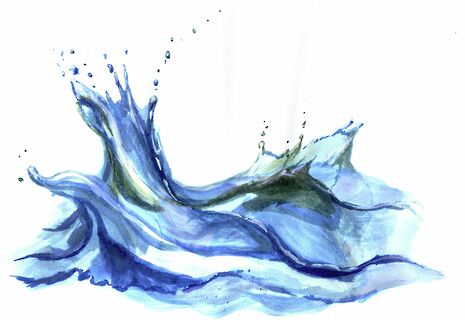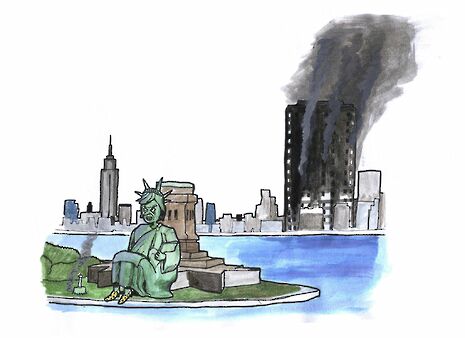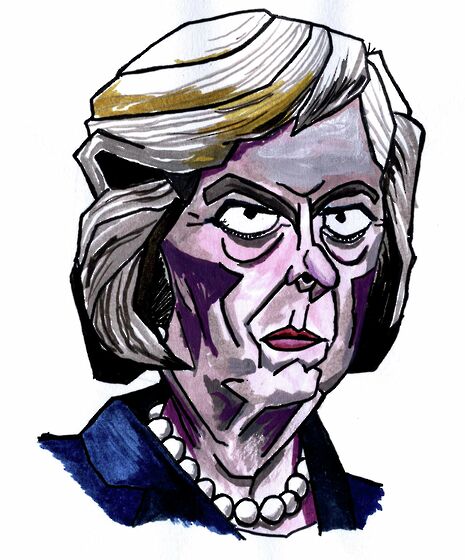Plunge: diving in or sinking down?
Is the uncertain political future an opportunity for productive debate, or burgeoning disillusionment?

Building back up
The Falling Man is an instantly recognisable photograph; taken by Richard Drew at 9:41am on the 11th of September 2001, the image depicts a man falling from the North Tower of the World Trade Center after two planes, piloted by members of al-Qaeda, targeted New York City. 2,996 people were killed by terrorists during these attacks, and over 6,000 others were injured, to say nothing of the deep and seemingly unending fear it embedded into Western society.
In the early hours of Wednesday 14th of June, Mahad Egal witnessed a father throw two of his children from the window of his flat in Grenfell Tower in Kensington, as the building was engulfed in flames. As further eye-witness reports come in describing scenes of terrified residents throwing themselves and their family members from the building to try and avoid burning or suffocating inside, the same chill runs down my spine as when I look back at The Falling Man.
Lily Allen was this week conveniently pulled from appearing on Newsnight, after her comments about the fire on Channel 4 News caused controversy. “I have never in my entire life seen an event like this where the death count has been downplayed by the mainstream media,” she said. “Seventeen? I’m sorry but I’m hearing from people that the figure is much closer to 150, and that many of those people are children.”
Allen is not alone in maintaining this belief; protests outside the council buildings in Chelsea and Kensington demanding an explanation are reflective of the anger felt by local residents. This anger is fueled partly by misrepresentative reporting, but incubated more prominently by the injustice experienced by all the residents of Grenfell Tower.
The block was recently ‘regenerated’, with a budget of around £8 million. Phillip Hammond, Chancellor of the Exchequer, revealed to Andrew Marr that as well as being banned in Europe and the US, the plastic cladding used to cover the outside of the building, added during this regeneration, was prohibited for commercial use in the UK. To fireproof the cladding would have cost £5,000. The British Sprinkler Association estimated that fitting sprinkler systems throughout the building would have added only 2 per cent to the overall cost.

The fire in Grenfell Tower was a seemingly inevitable by-product of the conflict between an age of austerity and those who have bought into London’s property bubble. Social housing has been neglected – redecorated for the benefit of those tasked merely with observing it, and structurally ignored, at great cost to the residents.
In the wake of the terrorist attacks that have taken place on British soil throughout the last three months, the loss of life and symbolic significance of the Grenfell Tower fire have been somewhat underplayed. For those who do not rely on social housing, fear has not been a consequence of the week’s events; The Falling Man seemingly more unsettling than the plea of Tamzin and Malek Belkadi (aged 6 and 8 respectively), who were orphaned by the fire.
The Grenfell Tower fire may not be comparable to acts of international terrorism, but it surprises and concerns me that we are not scared by it. Our government has been complicit in the deaths of dozens of innocent men, women, and children; and, moreover, our culture – of gentrification and misplaced morality – afforded them such an opportunity.
I am haunted by the all too familiar feeling of waking up to terrible news updates, from home and from abroad. It is up to us to decide where we go from here; we can harbour fear, or we can work to understand it, and try to overcome it. Justin Welby, the Archbishop of Canterbury, spoke of the “depths of sorrow” felt by those affected by the fire, but also of the “overwhelming depth of community” demonstrated by their response. There is hope, perhaps, that in this uncertain and uneasy time – when it feels more like we are sinking under than diving in – that things will be okay.
The memification of politics
The recent UK general election saw a huge youth turnout of nearly 67 per cent, a significant increase on just 44 per cent in 2010. As the 18-24 age demographic become increasingly engaged in voting and the democratic process, it becomes ever more important to explore the media through which young people interact with politics. While politicians have always relied on rhetorical slogans and soundbites, the internet meme is the new form of slogan, with the proliferation of social media transferring the political arena from the campaign trail to the internet.
Jeremy Corbyn’s support for the UK grime scene caused positive reactions in the ‘meme world’, with photos likening the Labour leader to Stormzy, and Jme both gently mocking but also humanising him. Theresa May’s awkward public persona and clunky ‘strong and stable’ soundbites lent themselves to memeified ridicule. In the past, it was only the major news outlets that could lambast politicians in such a public way. Now, thanks to the internet meme, everybody can propagate an opinion quickly. In this way, they can be empowering: memes are like “molotov JPEGs to be thrown at corporate hegemony’s bulletproof limousine”, in the words of Guardian columnist Douglas Haddow.
“…however much this new political medium may help spread ideas, the ideas themselves are simplified and reductive, focusing on aesthetics over depth”
There is no understating the now crucial significance of the meme in democracy. Ed Miliband’s 2015 election campaign was fundamentally undermined by The Sun’s front-page of him attempting to eat a bacon sandwich, with the caption ‘Save Our Bacon’. But however much this new political medium may help spread ideas, the ideas themselves are simplified and reductive, focusing on aesthetics over depth. Indeed, memes thrive on a lack of information – the faster you can grasp the point, the higher the chance it will spread and evolve. Politics has always had an element of the ‘personality contest’, and internet memes take this to the extreme.
Internet memes also favour fringe and more extreme political ideas – it is difficult to make short, snappy memes of centrist notions, as they lack the provocative element. Corbyn has evidently thrived on this desire within the youth vote for more extreme policies and a far-left agenda, and while Donald Trump is the antithesis of Corbyn in his politics, he too has benefited from his easily memeified approach.
The internet meme will shape our political landscape for years to come. In many ways, it has encouraged youth political engagement, albeit in a simplified and reductive form. In this age of memes, success in politics requires an in-depth understanding of this new cultural medium. “Running through the fields of wheat” just won’t cut it, I’m afraid.
Brexit and election fallout
Ever fancied diving from a cliff-edge? Well, no need to go it alone! Courtesy of Her Majesty’s Government and 52 per cent of the electorate, you can now sit back and enjoy the ride as the whole country takes a plunge into the deep, dark unknown. Brexit.
Included in the package: a moment of indecision where we all ask each other ‘Is this a good idea?’ and we all reply ‘diving means diving’. Some say it would be a good idea to land softly. Some others say it would be a good idea to Brexit with a bang. We all say ’Gravity is #fakenews, people’. Not sure how we’ll hit the water?

Here’s an idea: why not call an election about how we hit the water, and then not talk about hitting the water at all? Why talk about hitting the water when we can talk about how qualified (read: robotic) I am to lead us into the water? You can’t trust someone who talks to terrorists to lead us through the tricky business of hitting the water! Said Theresa May.
‘So instead, trust me to lead us as we hit the water!’ And when it was clear we didn’t trust her to lead us into the water: ‘Forget everything I said about making deals with Northern Irish terrorists… The Conservatives and the DUP will lead us into Brexit!’ The country, a little whiplashed from the freefall, managed a whimper of alarm.
But what does this mean for how we hit the water? What is the DUP’s stance on Brexit? Well, they want Northern Ireland and Britain to hug very tightly as we hit the water (but not in a gay way, no homo – the DUP wouldn’t have that). And though they are very committed to Brexit, they were always committed to a softer landing. And then there are other prominent people, like Chuka Umunna and David Cameron, who also say we should hit the water softly… though without being homophobes.
So after the fun and games, where are we now at with this Brexit plunge? Well, evil enemy of the people Michael Heseltine isn’t even convinced that ‘Diving means diving!’ anymore. Why not just fly back to the cliff-top? But if diving really is to mean diving, perhaps the Mayhem unleashed by Tory election failure and Labour election failure will give way to a more consensual approach to diving into Brexit. Maybe we’ll all agree on a landing position before we hit the waves, all the better to swim off towards some hazy horizon. On the other hand, I wouldn’t discount the possibility of an unsentimental slap from the sea. Consensus or chaos? Sink or swim? A hung parliament. A country hanging by a thread
 Comment / Plastic pubs: the problem with Cambridge alehouses 5 January 2026
Comment / Plastic pubs: the problem with Cambridge alehouses 5 January 2026 News / Cambridge academics stand out in King’s 2026 Honours List2 January 2026
News / Cambridge academics stand out in King’s 2026 Honours List2 January 2026 News / Cambridge businesses concerned infrastructure delays will hurt growth5 January 2026
News / Cambridge businesses concerned infrastructure delays will hurt growth5 January 2026 News / AstraZeneca sues for £32 million over faulty construction at Cambridge Campus31 December 2025
News / AstraZeneca sues for £32 million over faulty construction at Cambridge Campus31 December 2025 Interviews / You don’t need to peak at Cambridge, says Robin Harding31 December 2025
Interviews / You don’t need to peak at Cambridge, says Robin Harding31 December 2025








